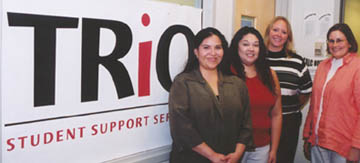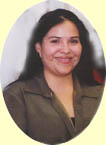






|
|
Director for WSUís new
Student Support Services sees Benefit in Early Peer Review
Introduction
/ How it Works /
Peer
Monitor Training / One
Program Director's Story / Resources
Never too soon!
Ask
Lucila Loera why she wants a peer review for Student Support Services
(SSS) before the program can even celebrate itsí first year in operation
and she will answer you with no reserve, "Why Not?"
Just shy of one year after her SSS program was
launched at Washington State University in Pullman, director Loera
requested a peer review of the program.
The review, which consists of a two day
evaluation (see sample agenda)
and assessment process, allows for peer feedback on aspects that may be
overlooked or in need of further development. For a program such as
Student Support Services, a peer review will ensure that as the focus of
the program, the students receive the highest level of guidance and
support available.
"Some colleagues asked me why I was
scheduling a review so soon," shares Loera. "My answer is
simply, 'Why not?' Our program is up and running. Why not benefit from
some expert feedback early on?"
As the
Director of SSS, Loera learned about the opportunity for a peer review
while attending a Directors' training in Portland last summer. "Since
we were building our program from scratch, I didn't want to waste time
doing something wrong," added Loera. "So I requested the audit.
It is very reassuring!" Rather than establish guidelines and
procedures that may not be fully inclusive or ultimately beneficial for
the program, Loera used the peer review as an opportunity to gain an
external and informed perspective from others with previous experience in
heading new programs. Through her efforts and the support of her staff,
Lucila Loera proves to be well on her way to ensure the success of SSS.
WSU's SSS
Team
With a Masterís Degree in
Counseling Psychology, Loera served as a Career Counselor at WSU for three
years before she was hired to launch the brand new Student Support
Services program at WSU.
By Fall 2002
she and her staff of three, pictured below, supported 160 students through
programs including academic advising, mentoring, cultural enrichment
activities, specific tutoring, career counseling, college orientation and
study skills training. In efforts to assure that students remain the
primary focus of the program, they hired a graduate student to help design
a database for students, enabling Loera and staff to track student
profiles, specific needs, and progress. The database also tracked the many
other students resting in a pending status, eagerly awaiting acceptance in
the SSS program. Finally, as the program rapidly expands and evolves, the
staff meets weekly and continues to rate itself on areas covered by the
official peer review.

WSU SSS staff includes, from right,
director Lucila Loera, Norma Sandoval, undergraduate support, Tiffany
DeMeerleer, senior secretary, and Vicki Trier, academic coordinator and
retention specialist.
Review
took two days and included meetings with WSU's Vice-President for Student
Affairs and other top staff
"Because we are new on campus, it
was great to include the top university administrators, including the
Vice-President for Student Affairs to this session, to help them better
understand what we are doing and highlight the importance of further
integrating SSS on campus," says Loera.
While awaiting the review's written report, Loera
confidently believed her program " benefited from the review
primarily because of the opportunity to ask questions from people with
years of experience in running TRiO programs. "In short, the review
affirmed that we are on track with a brand new program."
Loera asserts
that another benefit of the review stemmed from the "stronger
connection with the monitors who performed the review", including
seasoned TRIO professionals including SSS Directors Meredyth Goodwin from
the University of Idaho, Pat Clyde from Lewis-Clark State College, Sally
Burge from Eastern Washington University, and also Scott Clyde, chair of
the NASP Peer Review Committee.
Once the
review arrived in the hands of the SSS Team, Loera immediately worked to
incorporate the peer suggestions in a way specific to the program at
Washington State University. This proved to be a relatively simple task,
since suggestions focused on procedures the team already had in mind.
"One
helpful suggestion was to track any contact hours with our students.
Previously we had only tracked officially requested meetings with us, but
we are advised to also report contacts and information shared during
informal meetings on campus."
Other
tips to new program directors
Loera shares a few
additional tips her team received to new and potential TRIO
directors.
"The good news for new directors like me," adds Loera, "is
that we are not alone. There is a lot of great help out there in the TRiO
community."
-
Connect with
other TRIO programs "from day one"
Connect with other TRIO programs "from day one."
After being enlisted, Loera wasted no time in visiting nearby SSS
programs and learning first hand about their individual and specific
practice.
"I have learned that different directors have different
opinions on what are the best practices for SSS and on how regulations
are mandated. It is good to talk to several directors and learn about
the variety of options."
-
Partner with other
TRIO programs on your campus for marketing, etc.
Loera urges TRIO
Directors to partner with other TRIO programs on your campus for
marketing, etc.
WSU already had a McNair TRIO program
established before Loera was hired to launch a Student Support
Services Program. "Their staff was great to work with. They
helped me tremendously in knowing how to integrate the university
system with our SSS goals and regulations, says Loera.
"Our campus McNair leaders welcomed us
to join them in advertising our services at student fairs and other
campus events. They have provided a great help, and by working
together we magnify our presence and impact on campus.
"The good news for new directors like
me," adds Loera, "is that you are not alone. There is a lot of
great help out there."
Previous
/ Next: Resources
|

|
"Since we were building our
program from scratch, I didn't want to waste time doing something wrong.
So I requested the audit. It is very reassuring!"
--Lucila Loera, WSU SSS Director

Lucila Loera, director of Washington State
University TRIO Student Support Services requested a review less than a
year after she assumed leadership
|

